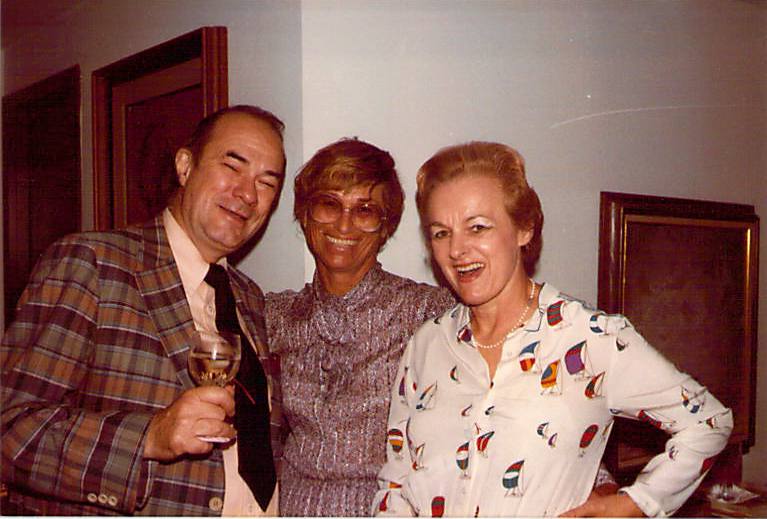
“This is my son, John. He’s the one who incarcerated me.”
Imagine that the person making this introduction was your mother in an assisted-living home. Imagine you were standing next to her, and this is how she chose to introduce you to her fellow inmates—very cheerfully and void of foul intent, venom, rage, or any other more moderate form of ill-feeling. Just, you know, cheerful.
Now imagine that her words, despite the hyperbole—a classic Southern trait—were almost entirely true. Well, not almost true. Actually true. In that moment, she introduced only me though she could have indicted David Strom, her attorney, had he been present. But David had the good sense not to be present.
The truth is David Strom and I did put her in prison, then known as Holley-Court, an assisted-living high-rise here in Oak Park, Il., about two and a half blocks from her longtime townhome residence on Kenilworth Ave., the same street she lived on for 40 years, the same address I came home to from college on Christmas break, the same street upon which my father’s ashes are buried, etc. But David and I only did it because she had fallen several times and I was frightened and concerned that I might lose my mother and my fiercest ally and David was frightened and concerned that he might lose a client and one of his fiercest friends. How fierce? Ask my brother.
Carolyn was and remains fierce, despite dementia, though she cloaks it in beguiling and innocent sounding expressions like “This is my son, John. He’s the one who incarcerated me.”
The truth is I endured more than one of those withering introductions. And if you were in my shoes, like me, you would have wanted to crawl down into them. No! You would have wanted to collapse into them and vanish completely, as when a crew sends a spark to a sufficient charge of dynamite, placed at the foot of a vacant high-rise building, so that the explosion causes the building to implode and crash inward, down in on itself, and fall into a cloud of cinder and ash, its own pulver, its final violent state. This, I hope, affords a tiny sense of how that felt. Did I mention that Carolyn is fierce?
So, the greater truth was that David and I together conspired to incarcerate Carolyn, guilty as charged, on the pretext of concern for her safety and well-being but the ugly truth is that decisions such as these are always a little self-serving. She had every right to call me out. How David emerged unscathed I cannot say.
Somehow and to this day not all the details have come to light, for the guile of a Southern woman is as deep as it needs to be, she engineered her escape in the classic style of a flamboyant felon given to panache: entirely within the confines of her cell. It’s a safe bet that she required only two ingredients, guile and smile, and mixed those together in the proportions required by alchemy and dark science.
But the one other ingredient that has come to light was “girl power”. Carolyn wanted to bust loose, and she quickly conceived that men, her own son among them, were her enemies. She therefore rallied forces—the only forces she could trust—viz., other women.
Somehow, with her private army and sleeper cells, she located a condominium, entirely situated on a single floor to remove the greatest dread, the consequences of a fall down a staircase, and ordered David to assist her in its purchase. She forthwith made David promise, fiercely I imagine, never to move her again, a promise that he, and I by proxy, have so far upheld.
The condo she purchased was a rebuke to another totem of the patriarchy, this time her late husband, Ray E. Poplett, who fifty years ago had vetoed a chance to purchase a unit in the same building[1].
Diana Ostreko combined forces with her and figured out a way to get every carpet, a baby grand piano, and precious curios out of a three-story townhouse and into her new home. The only complaint of her many doting nieces and nephews is that, in the transfer, the vinyl record of that Christmas classic, “A Child’s Christmas in Wales”, went missing.
They outfitted it exactly to her wishes as a place for hospitality and where great parties were likely to erupt. I do not think it was entirely an accident that her new home became the birthplace for a new cocktail, the “Moonhattan”, which uses all the same ingredients as a conventional Manhattan, except that bourbon is tossed fittingly in favor of moonshine.
The moral of this story is that two Yankee men can’t outwit a Southern woman. In fact, three can’t do it and, if you’re going to try, I advise you as a friend to start out with somebody other than my mother.
[1] I am sure that if we could have him back, Carolyn would restore him his veto power, albeit with a few Ts and Cs freshly amended.
Leave a Reply